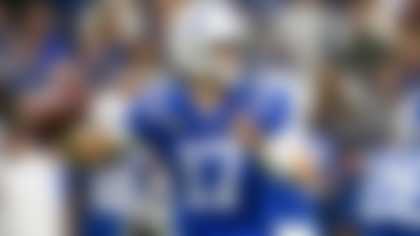Franchise quarterback is the most elusive and essential need in all of pro football. NFL teams are desperate to find one, willing to part with valuable draft capital or invest millions in the hopes of adding this critical piece to the roster. But too often in their pursuit of a top-tier passer, organizations mistake adequate for exceptional, fooling themselves into thinking a middle-of-the-road passer is worthy of being the face of the franchise.
So what is a franchise quarterback, and which teams have had the best run of them? To answer these two questions, we established four simple criteria and applied them to every quarterback since the common-era draft began in 1967, when the AFL and NFL first began drafting together. To qualify, a player must have 48 starts with one team and meet two of the following three requirements:
1) Winning regular-season record.
2) Minimum passer rating of 75.0.
3) At least one Pro Bowl selection.
None of these provisions alone paint a perfect picture, but together they help to illustrate sustained production at an above-average level. And at the core of what all fans crave from their quarterback is someone who consistently keeps the team competitive and provides a realistic shot at the playoffs. Everything else is gravy.
For every franchise passer teams get right, there are countless others they miss on entirely. That's why we've also identified each organization's biggest QB misstep. Perspective is important, and we should always remember just how bad things can get when dependable quarterback play disappears.
Because we only considered a player's performance from 1967 onward, some notable passers, such as Bart Starr and Don Meredith, aren't included, while others, like Johnny Unitas, only have post-'66 production factored into their franchise QB eligibility.
I'm sure you'll agree with all of the choices below, so I don't expect any disparaging tweets. Next up: AFC East.
NOTE: Pro Bowl totals below include AFL All-Star Game selections, while Super Bowl ring totals only include titles won as the team's starting quarterback. The names of franchise QBs who are also their team's current starter are in bold.
Buffalo Bills
THE Franchise QB: Jim Kelly
Kelly's arrival in Buffalo after a stint in the USFL snapped a 17-year franchise QB drought. By the end of the Hall of Famer's 11-year career with the Bills, he embodied the toughness tied to both the franchise and the city. Kelly dominates the Bills' record books, and though he never won the Big One (despite four consecutive attempts), he's still one of the most beloved figures in team history.
Biggest QB misstep: EJ Manuel
This is a tough one between Manuel and J.P. Losman, but I'm going Manuel here because he was a higher draft pick (No. 16 overall vs. No. 22) and his stats are almost indefensible. In fairness to Manuel, the Bills should never have drafted him in Round 1, and thus, he should never have had the expectations that come with being a top pick. That said, Manuel, who recently announced he's retiring from the NFL, never started more than 10 games in a season and was out of Buffalo after four years.
Dishonorable mention: The decision to bench Tyrod Taylor in favor of Nathan Peterman in Week 11 of the 2017 season looks as bad now as it did then.
Longest QB drought: 2005-present
Bledsoe barely made the cut-off per our definition of a franchise QB, so I understand if Bills fans feel this drought actually extends to the end of the Jim Kelly era. They've watched 20 different quarterbacks start for their team since Kelly last laced 'em up, including Alex Van Pelt, Brian Brohm, Ryan Fitzpatrick and Derek Anderson. But fans have legit reason to feel optimistic now, as second-year passer Josh Allen flashed in Year 1. Will he be the fourth franchise quarterback in team history (Jack Kemp was the first but isn't included here because the bulk of his career was played prior to 1967)? Too soon to tell, but the team is doing everything it can to build around its young QB1.
NOTE: I didn't count the pre-Kelly era in this section because it included 163 starts from Joe Ferguson. A third-rounder in 1973, Ferguson spent 12 seasons in Buffalo, going 77-86 with a 68.9 passer rating (and thus, not qualifying above). Although he never earned a Pro Bowl selection, he did help the team make three playoff appearances during his tenure. So while not a franchise QB by our measurement, I still want to show a little appreciation for Ferguson's longevity and fairly stable quarterbacking.
Miami Dolphins
Who qualifies for the Dolphins?
-- Jay Fiedler (2000-04): 59 starts | 36-23 | 0 Pro Bowls | 76.8 passer rating
-- Dan Marino (1983-1999): 240 starts | 147-93 | 9 Pro Bowls | 86.4 passer rating | 1 MVP
-- Bob Griese (1967-1980): 151 starts | 92-56-3 | 8 Pro Bowls | 77.1 passer rating | 2 SB rings
THE Franchise QB: Dan Marino
Griese has two Super Bowl rings, eight Pro Bowl nods (we're including his two AFL All-Star nods prior to the merger) and was part of the only undefeated team in the Super Bowl era. And still, the Hall of Famer can't overtake the ringless Marino in the Dolphins' pantheon of franchise QBs. That's how special Marino is to the organization and to the league as a whole. Despite playing his entire 17-year career (all with Miami) in an era that preceded the pass-friendly NFL we know today, Marino still ranks fifth all-time in yards (61,361), touchdown passes (420), completions (4,967) and attempts (8,358), while ranking fourth in fourth-quarter comebacks (33) and third in game-winning drives (47). He was awesome, and no amount of jewelry (or lack thereof) can diminish his standing in South Beach.
Biggest QB misstep: Passing on Matt Ryan
When two quarterbacks account for nearly 48 percent of your franchise's total regular-season games played, chances are things have gone pretty well for your team. So I'm taking the hindsight route for this one. Coming off a 1-15 campaign in which John Beck, Cleo Lemon and Trent Green combined for 12 TD passes, 16 INTs, 3,319 passing yards and 5.96 yards per attempt, Miami held the No. 1 overall pick in the 2008 draft. Instead of taking Boston College QB Matt Ryan, who has become the Atlanta Falcons' all-time franchise QB by a wide margin, Miami opted for Michigan left tackle Jake Long. Now, Long made four straight Pro Bowls and was a first-team All-Pro with the Dolphins, which is solid production. And after bringing in veteran QB Chad Pennington that offseason, the team experienced a 10-win turnaround, finishing 11-5 and earning a playoff berth. But that was as good as it got. Miami has won more than eight games only once in the 10 seasons since, while Long left in free agency after his rookie contract expired. Not exactly the longevity you're looking for from a top overall pick.
The Dolphins passing on Drew Brees not once (2001 draft), but twice (2006 free agency), was also a strong contender for this spot. While the first shun looks bad any way you spin it, the second is more understandable. I get not wanting to commit huge dollars to a quarterback coming off a severe shoulder injury to his throwing arm. Harder to swallow the decision to pass on the 2008 draft's clear-cut best passer just months after watching Beck, Lemon and Green do what they did.
Longest QB drought: 2004-present
Fiedler is a bit of an albatross in our system. He was not very productive or efficient and never made the Pro Bowl. He was also benched in 2004, his last year with the Dolphins, in favor of A.J. Feeley. The credit for his respectable winning percentage (.610) goes to Zach Thomas, Jason Taylor and the rest of the Dolphins' top-10 defense, which carried the team for much of Fiedler's tenure. Since 2004, the franchise ranks in the bottom third of most of the major passing categories, including yards (24th), TDs (23rd), INTs (24th), sacks allowed (27th) and passer rating (24th). Not surprising considering the litany of mediocre (or worse) passers that followed Fiedler: Joey Harrington, Tyler Thigpen, Chad Henne, Brock Osweiler and Ryan Tannehill, among others. Can newly acquired Josh Rosen jumpstart the franchise and return it to its winnings ways? For his sake and the franchise's, I sure hope so.
New England Patriots
THE Franchise QB: Tom Brady
The franchise quarterback of franchise quarterbacks. The GOAT. The six-time Super Bowl champ. The three-time MVP. Touchdown Tom. The Pharaoh? Titles, titles, titles. Takes longer to address Brady than it does Daenerys Targaryen. Brady's success is the envy of 31 franchises. My only criticism of TB12 is that in being so good for so long he's spoiled an entire generation of Patriots fans. Anything less than a Super Bowl title is a disappointment. The crash from such great heights will be unpleasant.
Biggest QB misstep: No proven, competent backup
The Pats are one freak Brady accident away from starting Brian Hoyer (1-10 in his last 11 starts) in 2019. Hoyer, who's in the final year of a three-year deal, is probably a great locker room guy and a solid second set of eyes for Brady. And the Pats have had recent success with unheralded backups stepping up big in relief (see Jimmy Garoppolo, Jacoby Brissett), but Hoyer is simply too close to real game action for a team with such lofty expectations. They did just draft Auburn QB Jarrett Stidham in the fourth round, so maybe he can develop into a nice option to succeed (or fill in for) Brady down the road.
The decision to draft Eason over Dan Marino in 1983 certainly hasn't aged well, but I have to think Patriots fans are more concerned about sustaining the team's unprecedented level of success in an injured- or post-GOAT world, than worrying about what might've been.
Longest QB drought: 1967-1983
Although Jim Plunkett began his career in New England in 1971, he didn't become a two-time Super Bowl champ until after he was traded away from the Patriots. The Pats struggled under center from post-merger until 1975, when they drafted Steve Grogan, and again in the late '80s/early '90s, when they had a quarterback carousel that featured the likes of Grogan, Eason, Doug Flutie and Hugh Millen, among others.
I know some Patriots fans might take offense to the drought containing years when Grogan was the team's starting QB (especially since Eason made our list of franchise QBs). After all, Grogan played 16 seasons with New England, led the franchise to multiple playoff appearances and held numerous Patriots records for years. But he was 0-3 in the playoffs, battled myriad injuries and eventually lost his job to Eason (before eventually re-taking it and then losing it again and then retiring a few years later -- it was complicated before Brady showed up). The biggest takeaway for Pats fans is that from 1993 to present day you've really only known above-average to all-time great quarterback play. Enjoy it. Nothing lasts.
New York Jets
Who qualifies for the Jets?
-- Chad Pennington (2000-07): 61 starts | 32-29 | 0 Pro Bowls | 88.9 passer rating
-- Vinny Testaverde (1998-2003, 2005): 61 starts | 35-26 | 1 Pro Bowl | 80.2 passer rating
-- Ken O'Brien (1984-1992): 106 starts | 50-55-1 | 2 Pro Bowls | 81.0 passer rating
-- Joe Namath (1967-1976): 103 starts | 52-50-1 | 4 Pro Bowls | 66.0 passer rating | 1 SB ring
THE Franchise QB: Joe Namath
It's been 43 years since Broadway Joe's final snap in a Jets uniform and yet he's still far and away the franchise's most beloved quarterback of all time. Although the Hall of Famer's stat line pales in comparison with most modern passers, he won back-to-back AFL Player of the Year awards in '68 and '69 and continues to hold the team's all-time passing touchdowns (133) and yards per attempt (7.55) marks. But, of course, Namath's legacy-defining moment came in January 1969, when the then-25-year-old signal-caller guaranteed -- and followed through on -- a Jets upset over the NFL's Baltimore Colts in Super Bowl III. The Jets' win sent shockwaves throughout the sports world and helped shape the NFL as we know it today. For the Jets' franchise, however, the victory Namath called has grown bittersweet: As great as the win was then, it remains the only Super Bowl appearance the team has ever had.
Biggest QB misstep: Handling of Mark Sanchez
Few quarterbacks have experienced such drastic swings in as short a period of time as "The Sanchize" did with the Jets. The 2009 fifth overall pick inherited one of the NFL's best defenses and a forceful run game, and was basically asked in Year 1 not to steer the ship into an iceberg. It often wasn't pretty, and the ship certainly stalled at times, but Sanchez did enough to guide the franchise to a conference championship game appearance. Similar request in Year 2 and a similar result, but this time the Jets beat Peyton Manning's Colts and Tom Brady's Patriots (both on the road) in the Wild Card and Divisional Rounds. Sanchez even outplayed Brady!
Then, things went sideways. The coaching staff asked Sanchez to do more, straying from the offense's run-heavy approach, and the boat began to capsize: Sanchez led the league in turnovers as the team finished 8-8 and missed the playoffs. After an offseason contract extension was followed by a 6-10 2012 campaign, Sanchez suddenly found himself entering the 2013 season entrenched in a true QB controversy, with newly selected second-round pick Geno Smith. Then, things somehow got worse. In a bizarre, head-scratching move that had franchise-altering implications, head coach Rex Ryan kept Sanchez in at QB (playing behind the third-string O-line) late in a preseason game. Sanchez would get hit by a Giants defender and suffer a season-ending shoulder injury that would lead to his eventual release months later. To be clear, I'm not suggesting Mark Sanchez was the answer in New York, or that he's not responsible for his lousy (and sometimes ludicrous) moments as a Jet. But to have your run as a franchise's QB1 curtailed because of a totally avoidable preseason injury, is, objectively, a terrible way to go out. After all, the guy has the most playoff wins in Jets history.
Longest QB drought: 2008-present
The collective cheer that erupted after the Jets selected Sam Darnold third overall in 2018 (and the relieved sigh that followed), captured faith renewed for a fan base that felt on the brink of a revolt. Will the sixth first-round QB taken by the franchise be the one who finally relieves Namath as the long-standing face of the franchise? There's certainly reason for hope after Darnold's rookie campaign, and with the organization spending big this offseason to bring in talented veterans, expectations are sky-high for the sophomore passer. For now, Jets fans can rejoice that the franchise is a bit farther removed from the days of Bryce Petty, Geno Smith, Tim Tebow and Kellen Clemens lining up under center.
Follow Ali Bhanpuri on Twitter @AliBhanpuri.












